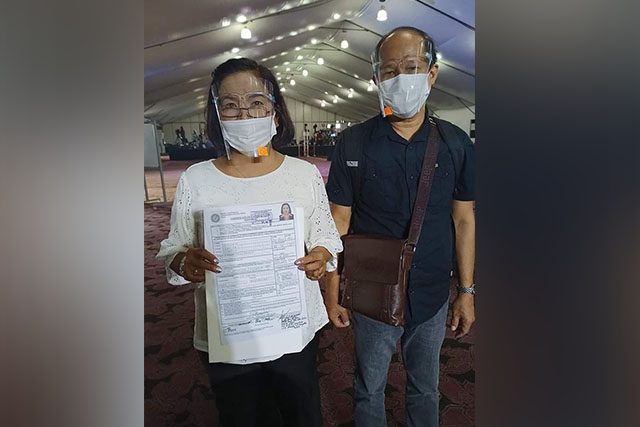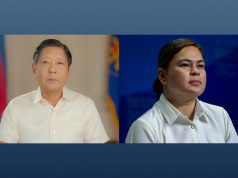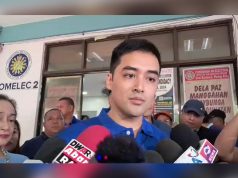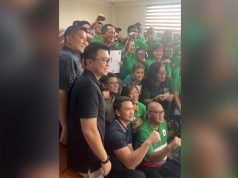
Concerns on making presidential qualifications more stringent were brought up after a civil engineer filed a Certificate of Candidacy for president on Monday and sang a religious song on the Commission on Elections stage.
Independent political aspirant Juanita Trocenio went to the Harbor Garden Tent in Sofitel Hotel to file her intent to run for the highest office in the land.
She is the first female presidential aspirant to file COC.
Trocencio in her speech said that Filipinos “need a real change” and addressed the Lord by saying that she will “love and take care” of them.
She also sang “Here I Am Lord,” a Christian hymn with lyrics based on the Bible verses found in the Books of Isaiah and Samuel.
A search on Facebook reveals that she has a profile with the following name: “Juanita Trocenio for President.” It has 322 followers as of this writing.
Her account has a description that reads: “Juanita Troenio’s is a public servant, not a traditional politician. Let’s help her in her bid for (presidency).”
The account is also listed as a “government official.”
Her candidacy was questioned by some online Filipinos who thought that the current qualifications for running as a president should be more stringent or rigid.
“There should be standard guidelines mandated by law to run for the presidency,” a Facebook user said in response to Trocencio’s COC filing.
“Taasan pa kasi dapat ang bigat ng kwalipikasyon ng tatakbo sa mataas na posisyon sa gobyerno… Hindi lang yung basta ‘ABLE TO READ AND WRITE’ … Ok na…” wrote another online user.
“Hindi porket sinabing karapatan nila ‘yan, pero bigyan din naman sana ng limitado. Puro pangulo pa talaga gusto nilang takbuhin, para tuloy nagiging kenkoy ang Pilipinas,” a different Filipino wrote.
“Panahon na para baguhin ang qualification sa mga nagnanais tumakbo sa gobyerno. Dapat talaga may certain qualifications para sa mga kandidato,” another Facebook user commented.
“Hindi pwede ‘yung kung sinu-sino na lang ang pwede mag-file ng kandidatura. Parang pag-aapply ng trabaho, may mga requirements na kailangang sundin na hindi naman lahat pwedeng qualified,” he added.
What makes a president?
The 1987 Philippine Constitution states that an individual may run as a president if he/she possesses the following qualifications:
- Natural born Filipino
- A registered voter
- Must be able to read and write
- 40 years of age at the day of the election
- Must have resided in the Philippines 10 years before the election is held
Early criteria for a Philippine president are stated in the Constitutional Program of the Philippine Republic crafted in 1898 by Apolinario Mabini when he was assigned as chief adviser of former president Emilio Aguinaldo.
“The President is the personification of the people and for this reason, his person is sacred and inviolable and he cannot be held responsible for any act performed during his term,” wrote Mabini, known in history as the “brains of the Philippine revolution.”
“The President is none other than the brother and friend of all Filipinos, and for this he should be considered as the first in honesty and in all the civic virtues,” the revolutionary figure said.
“It is a duty of honor and of conscience for him to live a life beyond reproach, as a sign of respect for his people before the entire civilized world and to give his countrymen an example of integrity and hard work,” Mabini added.
Other countries have more stringent qualifications for those running in the highest office.
In Singapore, part of the individual’s qualifier is that he/she must satisfy “the Presidential Elections Committee that he is a person of integrity, good character and reputation.”
He/she must also “held office for a period of 3 or more years as Minister, Chief Justice, Speaker, Attorney-General, Chairman of the Public Service Commission, Auditor-General, Accountant-General or Permanent Secretary” in the public service sector, among others.
Singapore is a republic with a parliamentary system of government based on the Westminster Model.









